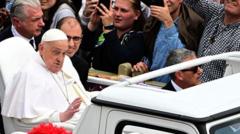As the news reverberates throughout the world, Vatican officials are set to implement century-old traditions to ensure a smooth transition of papal power following the death of Pope Francis. His passing introduces a pivotal moment for the church, prompting discussions among Cardinals about continuing his progressive legacy or reverting to more traditional practices.
Pope Francis Passes: A Transition Begins in the Vatican

Pope Francis Passes: A Transition Begins in the Vatican
The death of Pope Francis signals the start of significant changes in the Catholic Church's leadership.
Pope Francis's death was confirmed by the Vatican, marking a profound moment in Church history. Consequently, the rules governing the selection of his successor—one that has echoed through time—will be swiftly activated. The camerlengo, currently Cardinal Kevin Joseph Farrell, will assume temporary leadership of the Vatican, overseeing the arrangement of the pope's funeral and the necessary rituals of mourning.
Steps taken will include public viewings and a formal funeral service, after which the conclave will convene to elect a new pope. This period, known as the interregnum, represents both a time of sorrow and anticipation within the Church's global community.
Subsequent to his passing, discussions will arise around the future direction of the Church. Will Cardinals embrace the progressive values of Pope Francis, or will they choose to steer the Vatican towards traditionalist perspectives? As the world watches closely, the coming weeks will unfold in line with centuries-old practices that govern papal succession, setting the stage for the next chapter in Catholic history.
The attention will now shift to the preparations for the conclave and the impact of these decisions on the faithful worldwide. Who will take the reins in this pivotal moment remains one of the most pressing questions as the global Catholic community processes the loss of a transformative leader.
Steps taken will include public viewings and a formal funeral service, after which the conclave will convene to elect a new pope. This period, known as the interregnum, represents both a time of sorrow and anticipation within the Church's global community.
Subsequent to his passing, discussions will arise around the future direction of the Church. Will Cardinals embrace the progressive values of Pope Francis, or will they choose to steer the Vatican towards traditionalist perspectives? As the world watches closely, the coming weeks will unfold in line with centuries-old practices that govern papal succession, setting the stage for the next chapter in Catholic history.
The attention will now shift to the preparations for the conclave and the impact of these decisions on the faithful worldwide. Who will take the reins in this pivotal moment remains one of the most pressing questions as the global Catholic community processes the loss of a transformative leader.






















